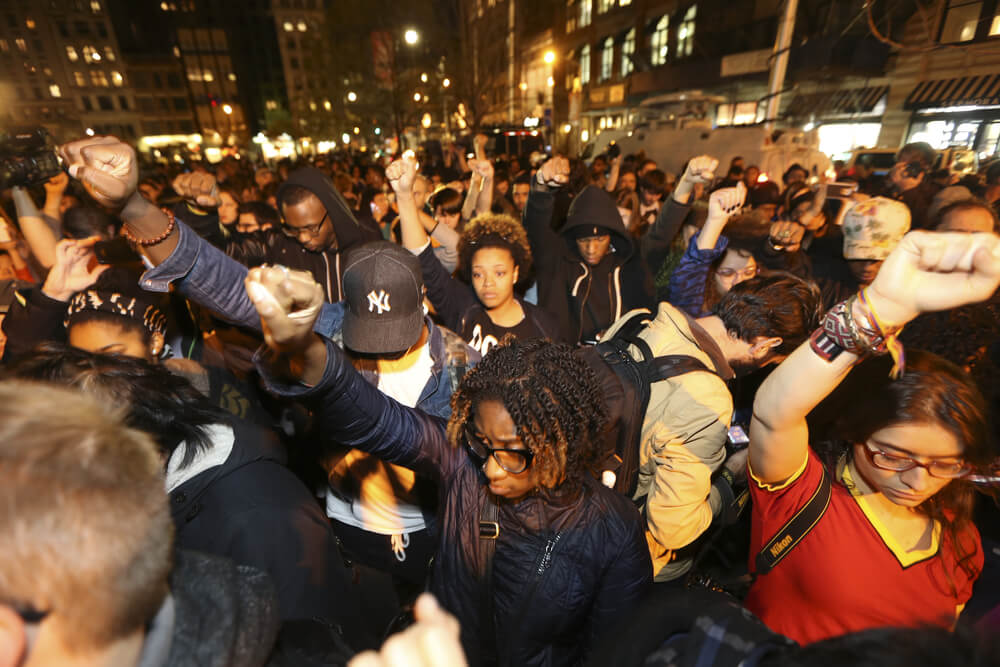This has been an infuriating year filled with injustice and scandal. But does the outrage we express in op-eds and on social media have a point?
This article was made possible because of the generous support of DAME members. We urgently need your help to keep publishing. Will you contribute just $5 a month to support our journalism?
A week ago I had a long bad night, and I feel like saying that brings with it an expectation that I will now tell a story of heavy drinking, or even that I left my living room. Instead I have only a very boring scene to sketch out: sitting in my living room, hitting refresh on the Twitter page. I think I might have been drinking one of the kinds of dreadful rich-hipster tea I’m too embarrassed to identify precisely in this context. That said, I was not totally cloistered from the outside world. Instead, I was listening to a man at a podium in Ferguson, Missouri, read a very glib statement whose result—anguish and frustration to the point of chaos—could not have been less than clear to him.
Of course while doing this I shot off a few angry tweets. They felt inconsequential in the way social-media forays always do, when looked at individually. I woke up the next day, tannins still souring my mouth, feeling ashamed of them. I still agreed with their contents, but I was also frustrated at my own addiction to the economy of favorites and retweets. Like most addictions it was covering up intense feelings about my own uselessness in this situations.
But then outrage always correlates strongly with futility, in my experience. That is the root of its discomfort, that it exists without regard to what you can actually accomplish with it. Which is usually very little.
2014 has been a year full of injustice and scandal and plainly, to many eyes, outrage of an unusually useless sort. I read Alexander Chee’s essay here months ago on the subject, wherein he said he had an “outrage hangover.” I know exactly what he meant. But over the course of a year filled with controversies which did not amount to an errant social-media status, I have also grown tired of equally knee-jerk sniping about the “outraged.”
The people of Ferguson were outraged, after all, and the people who have insisted on accountability for Bill Cosby were outraged, and those who wanted the same for Jian Ghomeshi were … well, you see the point. And the line between insisting that people only be outraged about real injustice, and actually burying real injustices by shaming people into silence by dismissing their words as “outrage,” is rarely clear to me.
For example: There’s a speech of Susan Sontag’s I’m often stuck on. She gave it upon accepting the Jerusalem Prize in 2004. It was an award she was much encouraged, at the time, to reject because of the fraught politics of the Middle East conflict. It is clear that the outrage ate at her, that she was both irritated by it and unable to discard it wholly. I can never decide if it was passive aggressive or, well, aggressive aggressive that she made her speech about the role of the writer in controversy itself:
A writer ought not to be an opinion-machine. As a Black poet in my country put it, when reproached by some fellow African-Americans for not writing poems about the indignities of racism, “A writer is not a jukebox.”
The writer’s first job is not to have opinions but to tell the truth … and refuse to be an accomplice of lies and misinformation. Literature is the house of nuance and contrariness against the voices of simplification. The job of the writer is to make it harder to believe the mental despoilers. The job of the writer is to make us see the world as it is, full of many different claims and parts and experiences.
The internal tension of this speech is what hooks me, much as I agree with it. I too tire of being a jukebox. In fact, every writer I know who does not have a comfortable Ivy League-sanctioned, foundation-funded perch feels the pressure of that quite keenly.
But we live in a world where “many different claims and parts and experiences” are still treated as mere matters of opinion. So even when you are trying to speak honestly from experience, from the world as you see it, you can get swept under the rug as an outrage-creator. In fact,that was made painfully clear in Ferguson. There are people in this country who have been saying for years that unarmed black men are being killed with impunity by the police. And then there are people like the prosecutor Bob McCulloch who, asked about this fact, treat it as if it were mere argument, a hypothesis. I’ll never forget him scolding a reporter in that press conference for merely suggesting the existence of the elephant in the room.
There is no reason to treat people as right because they are angry. If that was so, we’d have to ascribe a sort of priesthood to every blowhard who rises to the top of cable news and the op-ed page. But “nuance and contrariness,” as Sontag put it, i.e. the position of actual independent thinking, does demand that you consider that some of the anger comes from a place of genuine experience. And that being perennially calm, unflappable, cool—a McCulloch facing down the energy of the press corps—is just as much a performance and a political choice as being perpetually angry.
Michelle Dean is this week’s guest columnist for “All the Rage.” Kate Harding will return next week.
